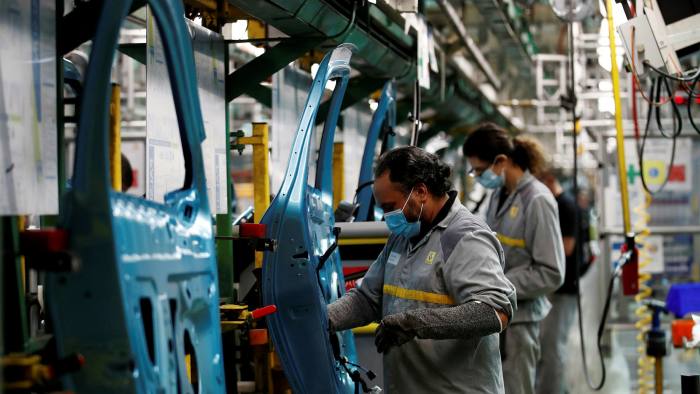
Renault to slash about 15,000 jobs in €2bn cost-cutting plan
Carmaker eyes production cuts after fall in demand during coronavirus crisis
by David KeohaneRenault plans to cut about 15,000 jobs, shrink production and restructure some of its French factories as the carmaker seeks to slash €2bn in costs amid falling demand and the aftermath of the 2018 arrest of Carlos Ghosn.
After recording its first loss in a decade last year and with sales slumping, Renault is trying to achieve more than €2bn in savings during the next three years while cutting global production capacity from 4m vehicles in 2019 to 3.3m by 2024.
“The slowdown of the automotive market combined with ever stricter regulations over the past three years partly contributed to our performance decline, and the Covid crisis has only aggravated an already existing situation and led us to take tough decisions,” said Renault’s interim chief executive Clotilde Delbos.
She added that the “adverse economic situation has shown the limits of our business model, which was betting on unprecedented market growth in emerging markets and therefore on record sales”.
Before his arrest on charges of financial misconduct in Japan, former Renault chief Mr Ghosn had targeted selling more than 5m vehicles by 2022.
Renault stressed on Friday that the cost-cutting plan was not a strategy reset and that new chief Luca de Meo, who once ran Volkswagen and will join this summer, could unveil his own direction for the company by the end of the year.
As part of the savings programme, Renault said it was launching discussions with unions to repurpose or close a number of plants in France, some of which — such as Flins, which makes the electric Zoe car — could stop making cars altogether.
The group has not made final decisions about the future of the six French sites under review, which include parts factories, as it faces political and union opposition. But Renault chairman Jean-Dominique Senard said that “the status quo is no longer possible”.
The planned job cuts across the group will take place by the end of 2022. They will be “based on retraining, internal mobility and voluntary departures” and include a reduction of 4,600 workers in France and more than 10,000 in the rest of the world. Renault employs more than 180,000 people globally.
French unions, which have said they fear four sites could be shut, have denounced “a project of social breakdown and deindustrialisation”.
The headcount reduction represents 40 per cent of planned savings, noted Philippe Houchois at Jefferies. Overall, Renault is aiming for €800m in cuts from reduced engineering costs, €650m from production and €700m from marketing and administration.
As part of the cuts, the group is reversing planned capacity increases in Morocco and Romania and looking at reducing or bringing home parts production capacity from other emerging markets.
Recommended
LexAutomobiles
Nissan/Renault: frenemies with benefits Premium
Renault’s plans, which will cost roughly €1.2bn to implement, will lean on a new strategy outlined by its alliance with Nissan and Mitsubishi on Wednesday that will involve the three groups carving up responsibilities across the partnership.
The strategy aims to cut costs of new vehicle development by up to 40 per cent. For each new model, the carmakers will select one company from the alliance to lead development.
It will also put each company in charge of specific markets: Europe and Russia for Renault; China, the US and Japan for Nissan; and south-east Asia for Mitsubishi. Nissan outlined its own survival plan this week.
In order to get it through the Covid-19 emergency, Renault has agreed a €5bn credit line with its banks, which will be guaranteed by the French state, but the government has yet to finalise that guarantee as it awaits clarification on the restructuring and job cuts, according to people familiar with the matter.
Mr Senard says Renault will try to not draw down the credit line while the group on Friday ruled out a rights issue. The French government is the company’s largest shareholder with just over 15 per cent.
To help the sector, the state has also increased subsidies for buyers of electric and hybrid cars. The plan will result in companies investing in production on French soil in exchange for government support.